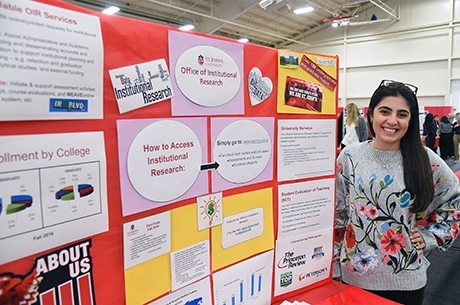Produced by: Office of Marketing and Communications

Research Month Highlights Student and Faculty Scholarship
As a junior at St. John’s, Haley Manchon ’17C was on a University service trip to Ecuador when she began studying the ways that public health education can help people to avoid pollution-borne illnesses.
An Ozanam Scholar and environmental studies major, Haley shared her findings this April as part of the University’s annual Research Month activities. Her paper, “Global Problems, Local Solutions,” outlined her work. “Environmental degradation affects Ecuador’s indigenous Shuar people,” she explained. “For my research, I devised an educational plan for young children to learn to boil water to prevent the spread of disease.”
Haley was among the many St. John’s students and professors who shared their scholarly work as part of Research Month. The Queens campus hosted a broad range of activities throughout April, including lectures, poster sessions, and oral presentations. On the Staten Island campus, oral presentations and performances took place from April 10 through 24.
Research Month’s largest event was the poster session in Taffner Field House. Conrado “Bobby” Gempesaw, Ph.D., President of St. John’s, welcomed several hundred students and faculty. He congratulated participants for their commitment, hard work, and dedication to generating scholarship, as reflected in the 160 posters on display this year. “Here at St. John’s,” he said, “it is a clear priority of ours to develop a collaborative spirit of inquiry and discovery between students and faculty.”
“When we work together,” noted Robert A. Mangione, Ed.D., Provost and Vice President for Academic Affairs, “our academic research projects can effect positive change even beyond the University’s gates.”
The Excitement of Research
“Research Month is so important because it formally prepares students to find answers,” noted psychology major Danika Charles ’17C. Danika tested the validity and reliability of the sense of humor scale developed in 2010 by renowned psychologist Paul McGee. “The work prepared me to write scientific papers; it also made me more ambitious.”
The posters described projects including studies on human trafficking, caffeine consumption and the risk of stroke in women, sickle cell anemia and its prevalence in the African American community, and bipolar disorder and gender correlations.
School psychology major Karley Gabriel ’19G posted a questionnaire over social media platforms to interview 520 participants for her research on anger mood induction. “Our results varied greatly among men and women,” she said. “That’s the exciting thing about conducting your own research: you never know what you’ll learn.”
“Students are thirsty for cutting-edge knowledge,” said Raymond A. DiGiuseppe, Ph.D., Professor of Psychology. Dr. DiGiuseppe mentored 14 students, ranging from undergraduates to Ph.D. candidates. “As a result, they help faculty do a better job.”
The 20th Annual Faculty Book Authors Reception took place on April 6 at the University’s Institute for Writing Studies. This year, St. John’s saluted 35 faculty who authored a total of 39 books, up from 19 books and authors last year.
The public lecture, “Big Data and Your Health,” was delivered in the D'Angelo Center on April 18 by Giancarlo Crocetti, Ph.D., an Associate Director and Data Scientist for the IT Research and Development department at Boehringer Ingelheim, as well as an Adjunct Professor at St. John’s. Dr. Crocetti, who teaches data mining, shared his expertise on digital technologies with an audience of more than 70 students, faculty, staff, administrators, and other guests. “‘Digital health’ is around the corner,” he noted, “and it will generate data on patients leading to treatments for chronic diseases.”
Students Thrive through Research
At the University’s 28th Annual Grants Reception, also held on April 18 in the D'Angelo Center, Simon Geir Møller, Ph.D., Senior Vice Provost and Professor, Biological Sciences, said “From test tubes to student success measures, research is thriving at St. John’s,” said Dr. Møller, “and that speaks volumes to the diverse research culture here, where students and faculty are focusing on many forms of scholarly work.”
Up from 35 last year, 48 students and faculty delivered oral presentations on April 20. The categories ranged from “Explorations of Economic Justice” to “Women’s Rights and Representations,” and from “Exploring New Techniques in Chemical Synthesis” to “Religious Identity, Freedom, and Action.”
At Staten Island, more than 100 students participated in Research Month activities, a 25 percent increase over last year. “We owe this growing engagement with Research Month on the Staten Island campus to a simple fact,” said Robert Fanuzzi, Ph.D., Associate Provost for Academic Affairs, “research brings students and faculty together and commits everyone to student success--our number one priority.”
